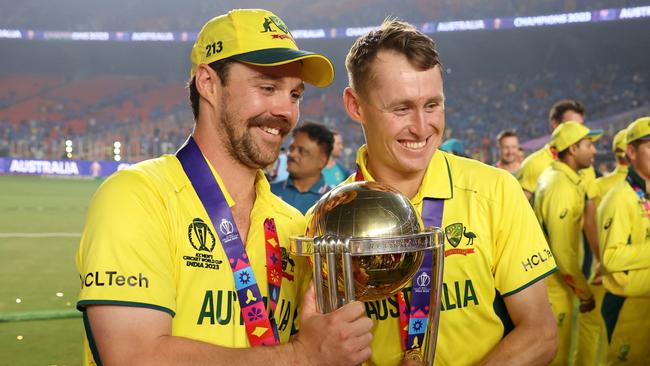
You have to hand it to them: Australia are a wonderful cricket team. In a year during which they have already won the World Test Championship and retained the Ashes, they added a record sixth World Cup to break the hearts of millions on a wild and tumultuous evening at the Narendra Modi Stadium in Ahmedabad.
They had to do it the hard way, in front of a massive, partisan crowd on a low, slow pudding of a pitch far removed from the bouncy surfaces of home and against an unbeaten team in top form. India, for almost the first time in the competition, were not at their best and when the dream died they left the field bitterly disappointed.
As in the semi-final, Australia’s victory belonged to their bowlers but their matchwinner was Travis Head, a man who missed the start of the tournament recovering from a broken hand, but who is held in such high regard that they never considered replacing him. He took an exceptional running, diving catch to dismiss the dangerous India captain Rohit Sharma and then hit a brilliant 95-ball hundred to calm nerves after the early loss of three wickets.
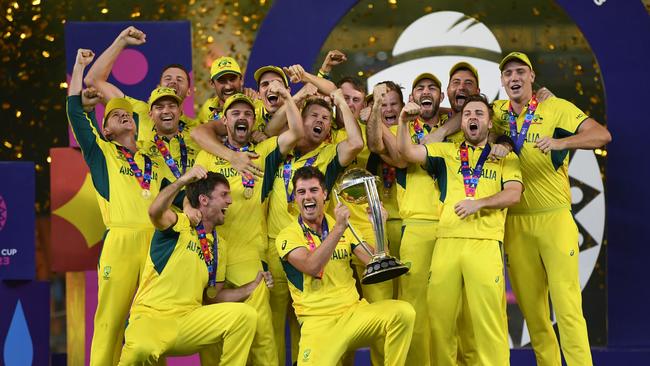
Five months ago, Head made 163 against India in the first innings of the World Test Championship final, on a devilish pitch at the start. Here, he survived some testing new-ball bowling and then plundered runs in his simple, uncomplicated manner, flaying anything fractionally wide and joining compatriots Ricky Ponting and Adam Gilchrist in making a hundred in a World Cup final, the seventh man to do so in all. He played superbly.
After a low-key reaction to his hundred, never has a World Cup final felt so partisan, with all but a seeming handful of the more than 100,000 spectators roaring India on. Pat Cummins, the Australia captain, had said on the eve of the game that silencing the crowd would be his team’s aim and pleasure and, on occasions, when key wickets fell, such as that of Virat Kohli, the ground had the atmosphere of a morgue. You could hear a mouse fart at that moment.
No specialist fast bowler had ever lifted the World Cup until Cummins. There had been all-rounders, such as Kapil Dev and Imran Khan, but batsmen otherwise. This year, Cummins has carried the torch for the fast bowler as leader and he, above all, had a night to remember: he made a bold decision to bowl at the toss, took a couple of key wickets, had a supreme night tactically with his bowling and fielding changes and finished the tournament as a winner.
What a turnaround from the start of the competition when his leadership was under scrutiny as Australia began with two defeats, but he held his nerve when others might have imploded. They are an experienced and battle-hardened team with a solid temperament and nerve who know how to win the big matches and moments and, as in their semi-final against South Africa, they began decisively.
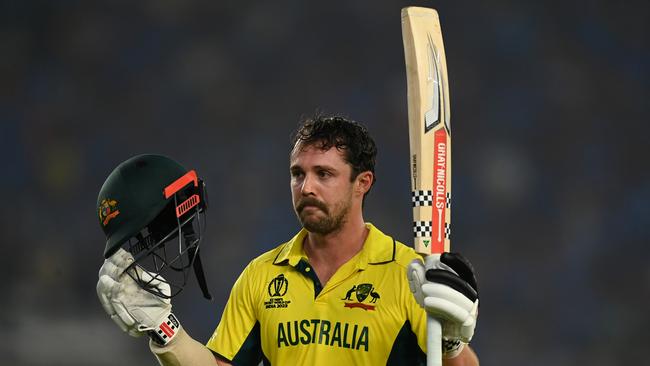
It was quite a scene before the start of play with a heaving and swaying sea of blue standing to sing the Indian national anthem in full voice. Elite cricketers are conditioned to be inured to even the most spine-tingling moments, as they concentrate on “process,” that pillar of professional wisdom, but even the most experienced must have felt the hairs on their necks prickle in that instant.
Half an hour earlier, Cummins had opted to field first, a brave call given the dry and cracked nature of the pitch, but one based on the expected arrival of dew later on, the record of teams chasing here, and in the past three World Cup finals. He cannot have imagined there would be much help from the surface, so to take three wickets in the opening 11 overs would have been beyond his expectations.
First, Shubman Gill was cramped pulling Mitchell Starc to leg, only to spoon a catch to mid-on. Having hit Glenn Maxwell for consecutive boundaries, and closing in on a rapid half-century, Rohit skyed to point, where Head took a brilliant running and then diving catch. Then Shreyas Iyer, always vulnerable to pace early on, edged behind. On each occasion, an eerie silence descended.
Of these, undoubtedly the key wicket was Rohit. He had begun in typically belligerent fashion, taking Josh Hazlewood for a brace of fours in the second over, a pulled six and a driven four in the fourth, then hitting a six off Starc in the fifth, reprising his lead-by-example act from the semi-final defeat of New Zealand. Maxwell’s second over brought a powerful straight six and a cut for four and then a wicket, as Rohit attempted another hit down the ground.
So much, then, rested on Kohli again, as it had in the fixture between these teams in the group stage, when he got India home after the loss of three early wickets. He had begun quietly until the seventh over, Starc’s fourth, when he hit three consecutive boundaries, the first not particularly well timed over mid-wicket, the second and third, off back and front foot, out of the sweet spot. He was up and running.
The loss of Iyer inevitably brought some retrenchment. This allowed Cummins to sneak some overs from his sixth and seventh bowlers, Mitchell Marsh and Head, as KL Rahul settled to the task with Kohli. Cummins switched things around repeatedly, utilising ten one-over spells at one stage, not allowing the batsmen to settle.
Kohli’s fifth consecutive half-century arrived - 56 balls, four boundaries - as he replaced helmet with cap, and when Rahul pulled Maxwell for four in the 27th over, it was the first boundary for 97 balls. Two overs later, the atmosphere went from colosseum to library as Kohli lingered motionless for a moment, unable to believe that he had dragged Cummins on to his stumps.
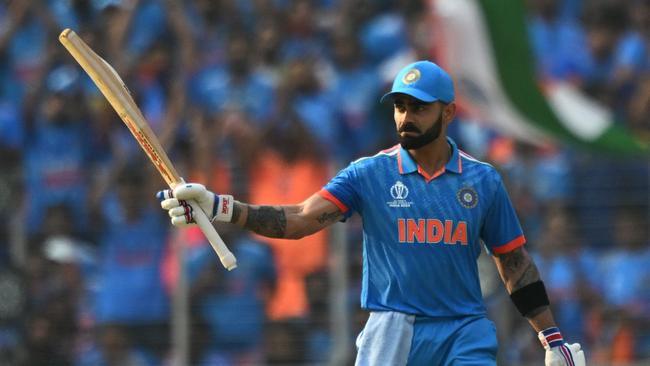
Ravindra Jadeja was promoted ahead of Suryakumar Yadav, the late-overs specialist, and Australia were only two wickets from Jasprit Bumrah coming in to bat. As the ball got older, boundaries became harder to find again, measured by Rahul’s half-century arriving in 86 balls but containing only one four.
The ball was dirty; the pitch dirtier still. Reverse-swing was always a possibility in such dry, abrasive conditions and Hazlewood and Starc are masters at exploiting such an opportunity. Jadeja and Rahul were both dismissed by mirror-image balls delivered from round the wicket and swinging against the angle, and the India innings fell away. The target was 241, one fewer than England needed four years ago.
Not surprisingly, given how difficult things became in the last third of the innings, Australia opted to take their chances against the new ball and David Warner and Head came out swinging, with 15 runs coming from the first over. But India’s new-ball attack has been potent and Mohammed Shami and Bumrah struck three times quickly, the last of them a wonderful slower ball from Bumrah to deceive Steve Smith, who chose, unwisely, not to review.
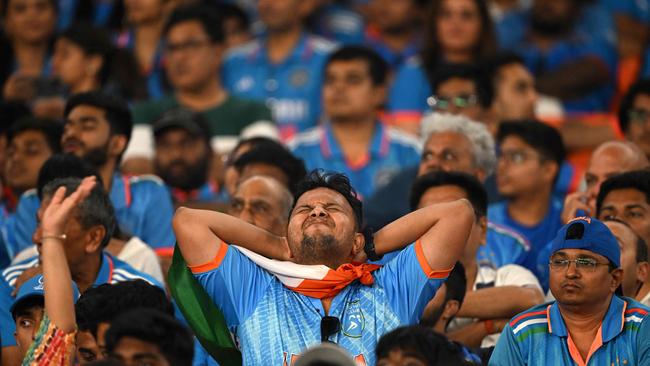
Nevertheless, by giving Shami the new ball for the first time, over Mohammed Siraj, it meant that Shami did not bowl at a time, just after the new ball, when he had been so successful during the tournament, and the pressure gradually reduced. When the change bowlers arrived, Rohit sat back a little and allowed Head and Marnus Labuschagne a toehold in the game, their fifty partnership coming in 70 balls.
Head played the eye-catching strokes, and did not spare anyone after the new-ball burst. Labuschagne’s calmness and class was a perfect combination given the type of run-chase in front of him, when the run rate was never likely to climb out of control and when wickets were needed above all. He was happy to go along in Head’s shadow, and his lack of ego was never more welcome from an Australian perspective.
Their partnership took them to within two runs of victory when Head, looking to finish it in style, pulled hard to deep mid-wicket. Victory followed immediately, the winning runs falling to Maxwell, whose genius had seen them past Afghanistan.
It put the seal on the careers of many in the Australia dressing room who will not come again in the 50-over World Cup. India saw victory as their destiny but it was not to be. Only Australia, you felt, could have denied them this time.
The Times






